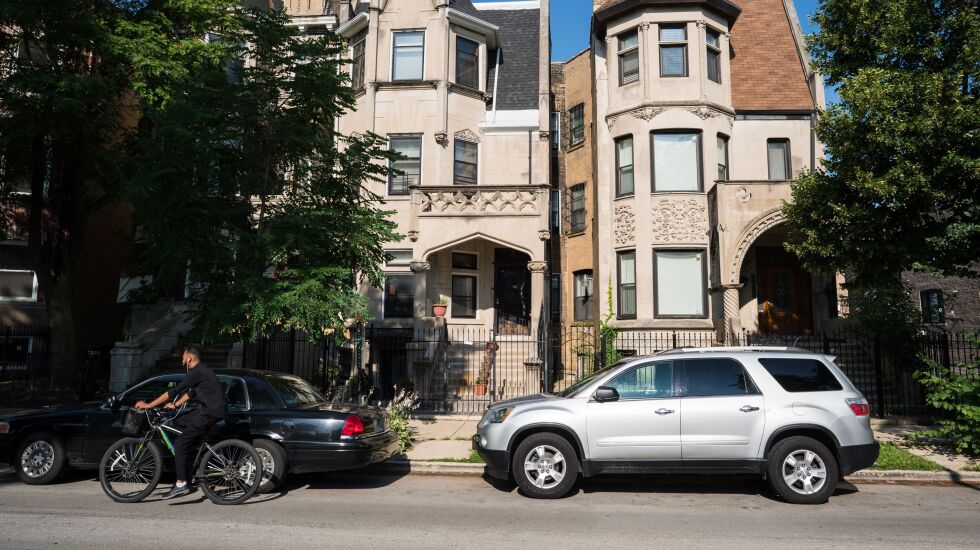
I stared at the computer screen in astonishment.
It was the fall of 2017, and I had recently moved to Kenwood from Auburn Gresham. Leaving was hard for me. I had moved to Auburn Gresham as a 3-year-old and left for college. When I returned, I thought I’d be there until my children went off to college.
Sometimes I questioned how long I’d stay. But for 12 years, I didn’t waver.
I’d grown accustomed to the sights of street memorials to murder victims, to boarded-up buildings, to the sounds of gunshots and police sirens. I’d resisted the urge to move after terrifying moments, like when I told my children to hit the floor at the sound of gunfire so loud that I was certain it came from just outside our front door, or when someone shot the CTA bus I was riding home from work on a late Friday night.
Despite the challenges, I felt at ease in Auburn Gresham. It was familiar. It was comfortable. It was home.
In 2017, I finally succumbed to the feeling that a change was needed. The image on the computer screen confirmed it: An online homicide tracker showed a screen covered in red dots, representing around 300 homicides over a three-year period within a two-mile radius of my old home, an area consisting mostly of Auburn Gresham, Englewood and West Englewood.
In stark contrast, the map for my new address — an area including most of Kenwood, Oakland, Grand Boulevard, Douglas and Hyde Park — showed fewer than a third of the homicides around my old home.
My new community of Kenwood, part of the greater Bronzeville area, was vibrant. Homes were being renovated, Black-owned businesses were opening, and the Black elite were visible, cruising in high-end vehicles and walking up to their $700,000 homes.
I’d never lived in a Black community with as much electricity, wealth and prosperity, and with few of the social ills often found in Black spaces. I didn’t want to live anywhere else.
My peace was shattered one day.
Bronzeville had become a landing spot for Black professionals, but it was also attracting others.
At an outdoor, back-to-school movie night sponsored by my block club in the late summer of 2020 — the crowd was racially mixed, though mostly either Black or white — we met an older white man, a retired teacher. When my middle daughter told him she wanted to pursue a career in psychology, his face lit up. He wanted to connect her with a friend who was a psychologist. We traded contact information. Within a couple of days, he emailed his friend’s information.
About two weeks later, he came by our home unexpectedly. Somewhat puzzled, I greeted him at the front door. He said he was concerned that my daughter hadn’t followed up with his psychologist friend. I told him I hadn’t spoken with her about it, so I was unaware of where things stood. He said that he’d hoped the connection would help her.
“I just want her to make something of herself,” he said.
I froze.
In a split second, I was awash with anger.
I took a moment to gather myself. “I’ll discuss it with her. Thanks for stopping by,” I replied curtly before closing the door. I had to end the conversation and put a barrier between the two of us before I exploded.
It seemed clear that he had the best of intentions. He was earnest and spoke with sincerity. But it was also clear he had no idea of how deeply he had offended me, and how much he belittled my daughter — who didn’t need saving.
For her, college isn’t a dream, it’s an expectation. Dozens of her relatives — including her parents — are college graduates. She finished among the top third of her class at Brooks College Prep, among the nation’s top high schools.
He didn’t know that, but he didn’t need to know it. His 20-minute talk with her should have removed any doubts about her capabilities.
Perhaps implicit bias made him incapable of overcoming his assumptions about my daughter and her prospects. Perhaps he didn’t think about how he’d feel, as a father, if someone he barely knew came to his home unexpectedly and raised similar concerns about his children.
People who’ve never endured racial stereotypes have a blind spot. They should exercise caution when interacting with people who have often experienced racism. What might seem an act of kindness could actually be a microaggression that causes severe pain and frustration.
I think back to Auburn Gresham: Despite its struggles, it still felt like a refuge. As an undeniably Black space, I felt like I could be me — free of the fears, misconceptions and judgments of others.
Kenwood provided an improved quality of life, but moving there still came with a cost — perhaps one that I, as a Black man, might never be able to avoid.
Alden Loury is the senior editor of race, class, and communities at WBEZ.
The Sun-Times welcomes letters to the editor and op-eds. See our guidelines.







